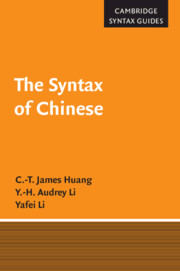Introduction
Published online by Cambridge University Press: 05 June 2012
Summary
Over the last quarter-century, there has been a surge of research on Chinese syntax. A cursory look at the programs of Chinese linguistics conferences held since 1985 shows that at least a full continuous session has been devoted to Chinese syntax throughout each day of every conference. Those who were involved in organizing such conferences can also recall the large number of syntax abstracts, routinely accounting for fifty to sixty percent of all abstracts received for review. It is also during this past quarter-century that a significant number of theoretically oriented works on Chinese syntax began to appear in major refereed academic journals published in the West. Several monographic, theoretical treatments of Chinese syntax have also appeared that distinguished themselves from earlier general descriptions or reference grammars. In the field of theoretical linguistics, more works than before make crucial reference to Chinese syntax. It is clear that research on Chinese syntax that is informed by modern linguistic theories has been productive. In turn, it is also clear that the study of Chinese syntax has played an ever-increasing role in linguists' construction of modern “mainstream” syntactic theories.
Most of these “modern syntactic theories” are in one form or another theories falling under the formal paradigm of generative grammar. Of these formal treatments, much research has been carried out in the Principles-and-Parameters (P&P) approach initiated by Chomsky and his colleagues and students around 1980, plus and minus two or three years, in its various incarnations including the so-called Government-and-Binding (GB) framework, the Barriers framework, and recent attempts at theoretical economy aimed at the ideals of the Minimalist-Program (MP).
- Type
- Chapter
- Information
- The Syntax of Chinese , pp. 1 - 8Publisher: Cambridge University PressPrint publication year: 2009



